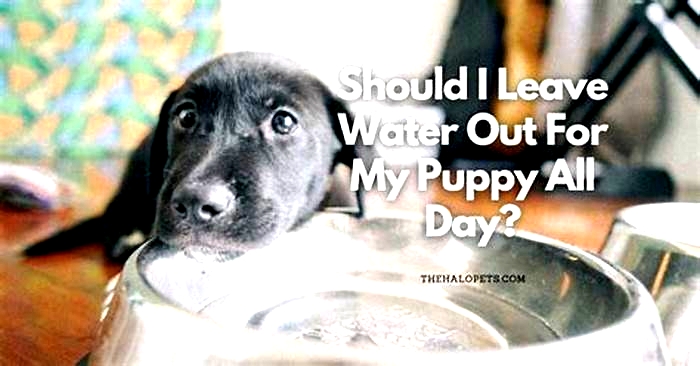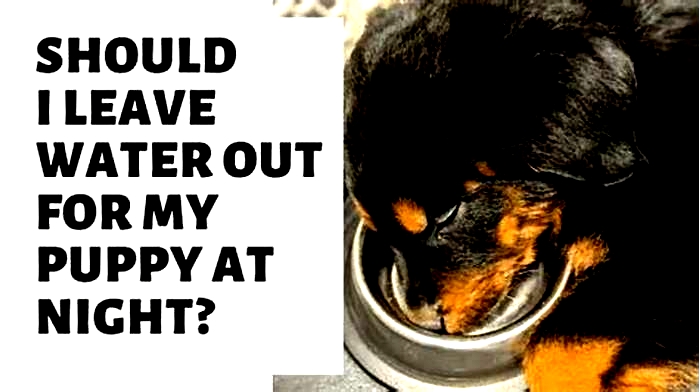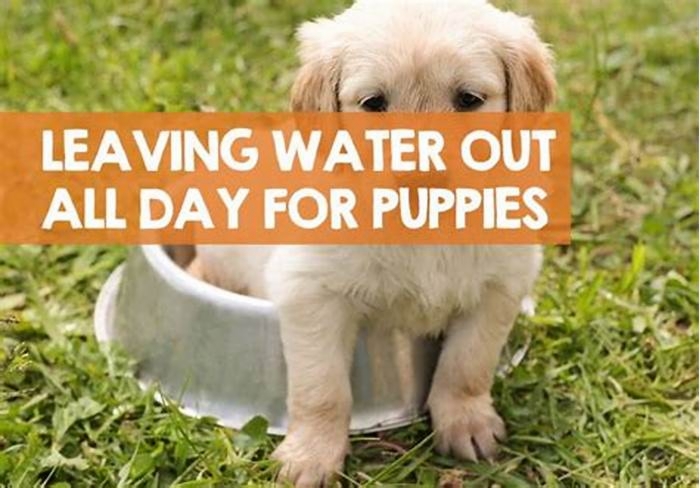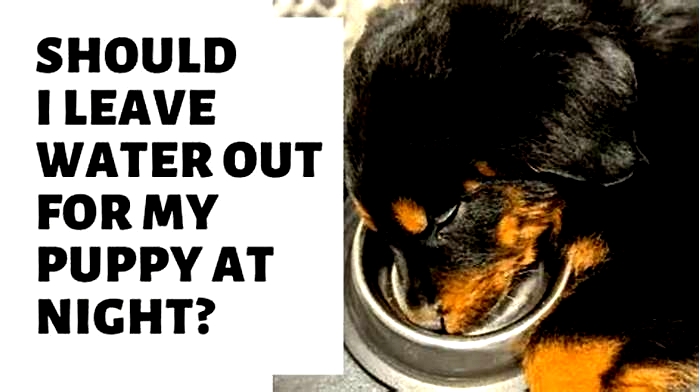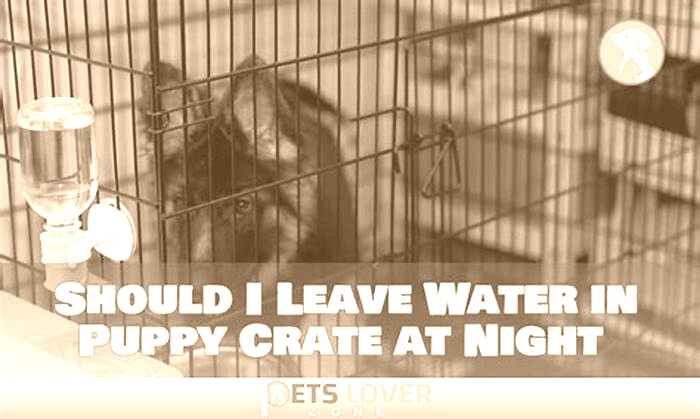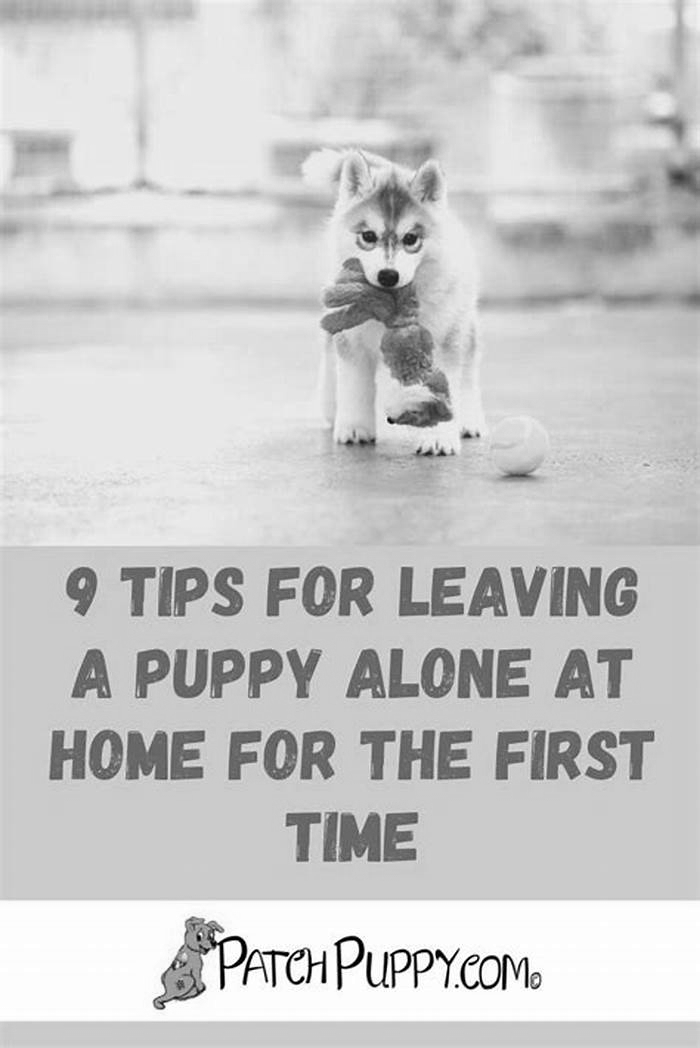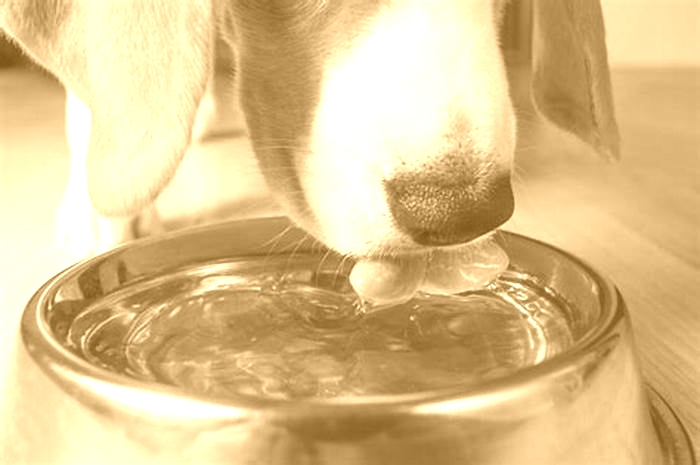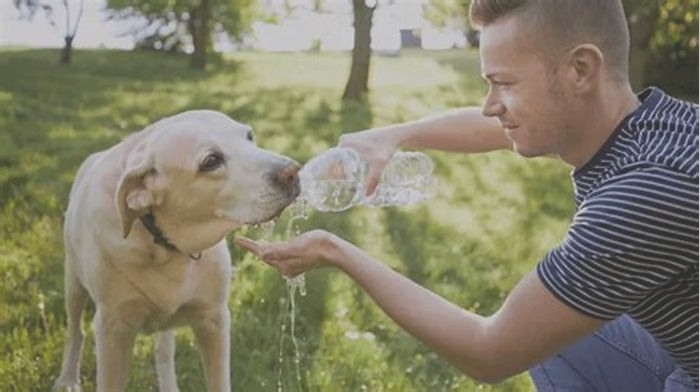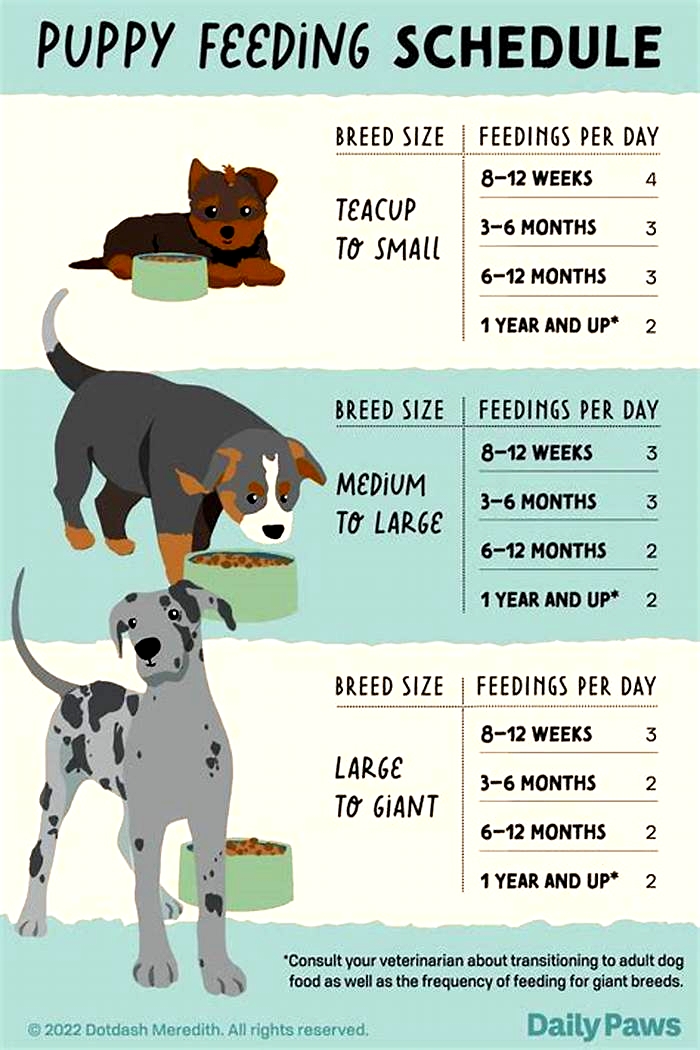Should I leave water out for my puppy all day
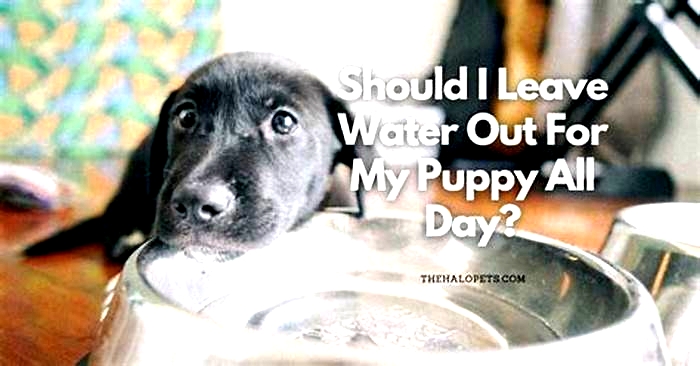
Should I Leave Water Out for My Puppy All Day?
Puppies are manic and with all that running around they do, can be at risk of becoming dehydrated. Evidently, they will need water, but it begs the question whether theres such a thing as too much, and whether you should keep water out for your puppy all day.
For example, it can be difficult to know if there are any risks associated with leaving water standing for long periods, or how regularly sources of water should be changed. Similarly, knowing how much water to leave out for your pup to avoid accidents in the house can be extremely useful, too.
Should I leave water out for my puppy all day? You should leave water out for your puppy all day, so they have access to it. However, the water should be changed twice a day for a clean supply, and the water bowl should be cleaned every 24 to 48 hours to avoid bacteria.
How to leave water out all day for your dog or puppy
Thats the very short answer above about leaving water out for your puppy or dog all day. But theres a bit more you should also know which Ive detailed below.
How often should I change the water in my puppys bowl?
Looking after a new puppy can often be stressful. Although most young dogs are able-bodied and sturdy, there are many factors to consider in keeping them happy and healthy.
Alongside providing them with regular exercise, we need to make sure our furry companions are receiving enough nutrition and water in their diets, as well as regular check-ups, grooming appointments, preventive measures for ticks and fleas, and the right amount of socialization.

Therefore, it can be easy to forget smaller tasks such as changing the water in our puppys bowls, keeping it fresh throughout the day. In colder weather, it also means taking measures to stop the water freezing, if its an outdoor bowl.
Unfortunately, when you leave water out for your puppy all day, the bowls can quickly become a breeding ground for bacteria without regular cleaning and the supply of new water.
Microorganisms present in your puppys saliva are often responsible for this change, being transferred to their water bowl each time they decide to take a drink and thereby causing bacteria to form.
Therefore, you should make sure to change the water in their bowls at least once a day to prevent this from happening. In addition, you should also make sure to thoroughly clean the bowl each time you do this.
Although some owners may think this is over the top, puppies can quickly become sick if they are exposed to bacteria-laden water.
Likewise, you should also make a habit of washing your pups bowl with hot soapy water (or stronger cleaning agents) once every 3 or 4 days, eliminating any chances of strong bacteria persisting after initial cleanings.
Furthermore, ensure that you sweep and mop any areas that your puppys bowls are located, together with washing any placemats the bowls are placed on. This is vitally important if you tend to feed your pup close to where it drinks from, as bacteria can quickly spread from food to water.
Doing so can also offer protection against other dogs in your household. Sometimes older dogs can urinate on or near water bowls when new puppies come into the home.
Typically, this happens when small pieces of food, sometimes lying undiscovered for days, are picked up by your puppy and transferred to their water bowls, leading to contamination.
For this reason, we recommend keeping standing water and food sources separate when possible.
Should I leave water out for my puppy during the night?
There is nothing fundamentally wrong with leaving your puppy without water overnight, it is perfectly safe to do so. In fact, this is sometimes essential to prevent your pup from having an accident in the middle of the night, especially if they are not house trained yet.
However, in particularly warm climates, puppies may occasionally wake up and search for water. If you reside in an area such as this, do not ignore your pups behavior as it could be dehydrated.
If this is a regular occurrence, you should leave water out for your puppy all day and night in a water bowl. Put it in a suitable area and try to create a spot where your puppy can pee safely in a spot of your choosing.
Similarly, always make sure that your pup has had a drink of water at least an hour or two before bedtime to prevent dehydration during the night. Unfortunately, most young puppies are unable to hold their urine for more than a few hours at a time.

Therefore, it is not unusual for puppies to need multiple potty breaks during the night even when they do not have access to water. For owners who crate their pups, waking up in the middle of the night is a regular occurrence.
Interestingly, there exists a semi-reliable way for owners to figure out how long their pups can hold their bladders. As a general rule of thumb, pups can hold their urine for the same number of hours as they are months old.
For example, a four-month-old puppy can normally hold its pee for 4 hours, and a 5-month-old pup around 5 hours. However, from time to time, and typically when they are exhausted, they may be able to hold their urine for longer periods.
How much water does a puppy need to drink per day?
Fresh cool water should always be made available for your puppy. As previously mentioned, puppies burn a lot of energy throughout the day and this activity plays a role in how much water they require to drink.
Puppies come in all different personalities, sizes, and breeds and this can sometimes affect how energetic or lazy they can be.
Therefore, less energetic pups will typically drink less water when compared to their high-energy siblings. This is entirely normal and should not cause you any concern.
Despite this, it is essential to take the current temperature and humidity levels of your area into consideration make sure to put out plenty of extra water when the weather turns hot, especially if you own several dogs.
In general, puppies recently weaned off their mothers milk require around 15 to 30ml water per pound of body weight per day to stay healthy.
Without access to this critical amount of fluid, puppies can be at risk of suffering from kidney damage and heart problems caused by dehydration, as well as heatstroke during the warmer months.
So long as fresh water is easily accessible, puppies will naturally drink when they are thirsty enough. However, in rare circumstances, some pups may refuse water entirely. If you notice this is the case with your pooch, take them to the vet as soon as possible. This could indicate that they are suffering from a serious medical condition.
Handy Hint: I dont advise giving puppies freedom of the house until they are 12 to 18 months of age, as I learned from my mistakes!
Can puppies drink too much water if you leave it out?
Although it is very important to ensure that your puppy does not suffer from dehydration, sometimes drinking too much water can be a bad thing for them.
Worryingly, many dog owners are unaware that the presence of dangerous quantities of water in their pups bodies can lead to severe illness and even death. On the flipside, some dogs wont drink enough water at all, but thats different problem.
Water intoxication, also known as water poisoning, water toxemia, and hyperhydration is a relatively rare condition that is most commonly seen in water-loving canines (where they inadvertently swallow water whilst swimming).
However, puppies can easily develop water intoxication just from spending too much time at their water bowls.
When a young canine is overwhelmed by water, its sodium levels drop which in turn causes swelling to occur throughout its cells. Some areas of the body can cope with this abnormal activity, but others, particularly the brain will struggle to function.
At this stage, water intoxication can quickly turn fatal. It is vital to get your puppy to the vet if they show any symptoms of water intoxication, no matter how small, as this condition progresses rapidly.
Similarly, you should also take your puppy to the vet if you notice they are drinking excessive amounts of water, as quick action can stop the condition from occurring in the first place. In most cases, excessive drinking can be treated without canines suffering any negative health issues.
Some of the most common symptoms of water intoxication to look out for are loss of coordination, bloating, vomiting, excessive salivation, seizures, glazed eyes, pale gums, and lethargy.
In worst-case scenarios, affected puppies can enter a comatose state, becoming unresponsive to touch and sound. Whilst at the vets, canines will be treated with a mix of IV delivery and administration of electrolytes, drugs, and diuretics to reduce brain swelling.
Conclusion
Ask any owner about their puppys strongest characteristics and they are likely to mention their seemingly never-ending amount of energy as one of the most defining.
Throughout the day, young pups keep themselves entertained by taking part in numerous vigorous activities like chasing their siblings around the home, playing with their toys, and running around the backyard.
Naturally, with this high level of activity comes an increased need for water. Without drinking regularly, puppies can quickly become dehydrated, leading to a whole host of health problems.
Thankfully, most dog owners are aware of this, and as such, they make sure to leave countless water bowls out for their furry companions to quench their thirst.
However, one question that puppy parents rarely ask themselves is whether leaving water bowls all day long is safe.
In my view, you can leave water out all day for your puppy, but closely monitor them.
You might also like
Image in header via https://pixabay.com/photos/puppy-golden-retriever-dog-young-1207816/
Should I Leave Water Out For My Puppy All Day? Pros And Cons
Taking proper care of your puppy is essential to their development. One of the main things that require great attention is your puppys hydration. Here, it is not just a matter of leaving the water out each day, but you also have to know the amount your dog should drink each day. This is especially the case if you are a dog parent that will not always spend the day with your puppy. Also, clean water is essential as it will help your dog avoid any issues from contaminated water. So, should I leave water out for my puppy all day?
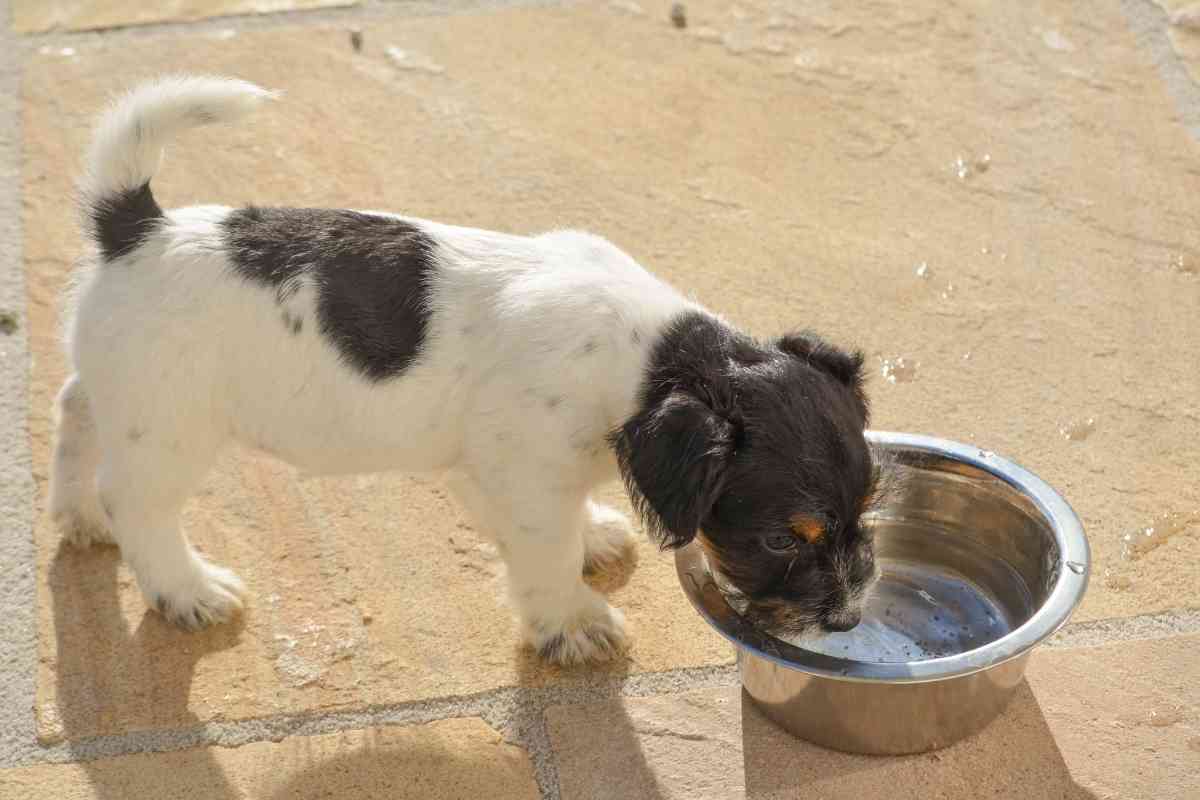
Should I leave water out for my puppy all day?
In most circumstances, leaving a water bowl available for your dog all day is a smart idea. When you do so, you guarantee that the puppy is fully hydrated throughout their most active period. It is critical for a dogs healthy development and growth to stay hydrated.
Typically, a young puppy should drink about half to one ounce of water per day for each pound of weight. So, for example, if your puppy weighs 8 pounds, they should drink about 8 ounces daily; that is around half a cup of water. This will ensure they stay hydrated and that their body gets all the water they need during the dogs most active time of the day.
Of course, the amount of water suggested above is not set in stone. While it might be okay for pet parents living in moderate climates, those living in hotter climates should ensure their puppies drink a lot more water than this.
Pros of Leaving Water Out for Your Puppy
- The puppy will have access to enough water they require to mature, healthy and strong.
- It helps the puppy learn how to self-regulate water intake; instead of drinking too much water only a few times per day, your puppy should learn that tiny quantities may be consumed at any time.
- Unwanted behavior like resource guarding will be avoided if water is freely available.
- Your puppy drinking excessive water might indicate underlying health problems like diabetes or kidney disease.
Will I Have to Take My Puppy Out More Times If They Drink a Lot of Water?
There are no risks associated with putting water out all day, given that you put the water bowl or dish in a secure location. Remember to clean the container to remove any objects and dirt, and refill it with clean water frequently.
Certainly, when the puppy is a heavy drinker, you might need to take him outdoors more regularly for potty training sessions, but that is a necessary component of being a good and responsible pet parent.
How Serious Is Dehydration for Puppies?
Pups can be dehydrated quickly, which can harm their kidneys and heart. A puppy ought not to spend more than three to four hours without a drink since severe dehydration is fatal for them. As a responsible pet parent, you must ensure this does not happen. Some of the most common symptoms of dehydration in puppies may include:
- Lethargy and weakness
- Loss of appetite and vomiting
- Pale gums and a dry mouth
- Heavy panting
- Diarrhea
- Sticky saliva
- Wide eye and dry nose
Your puppy may form crusty scabs all around their muzzle if they dehydrate for an extended time.
Lightly pulling the scruff of fur around the dogs shoulders and neck is a straightforward technique to see if they are sufficiently moisturized. The skin should ideally snap to its original position instantaneously. This shows that the skin has adequate hydration and flexibility.
When the puppys skin gradually resumes its former state, perform another test by sliding your fingers along their gums to determine whether or not they are dry. Dry gums are an indication that your puppy requires extra water right away.
My Puppy Does Not Drink Enough Water?
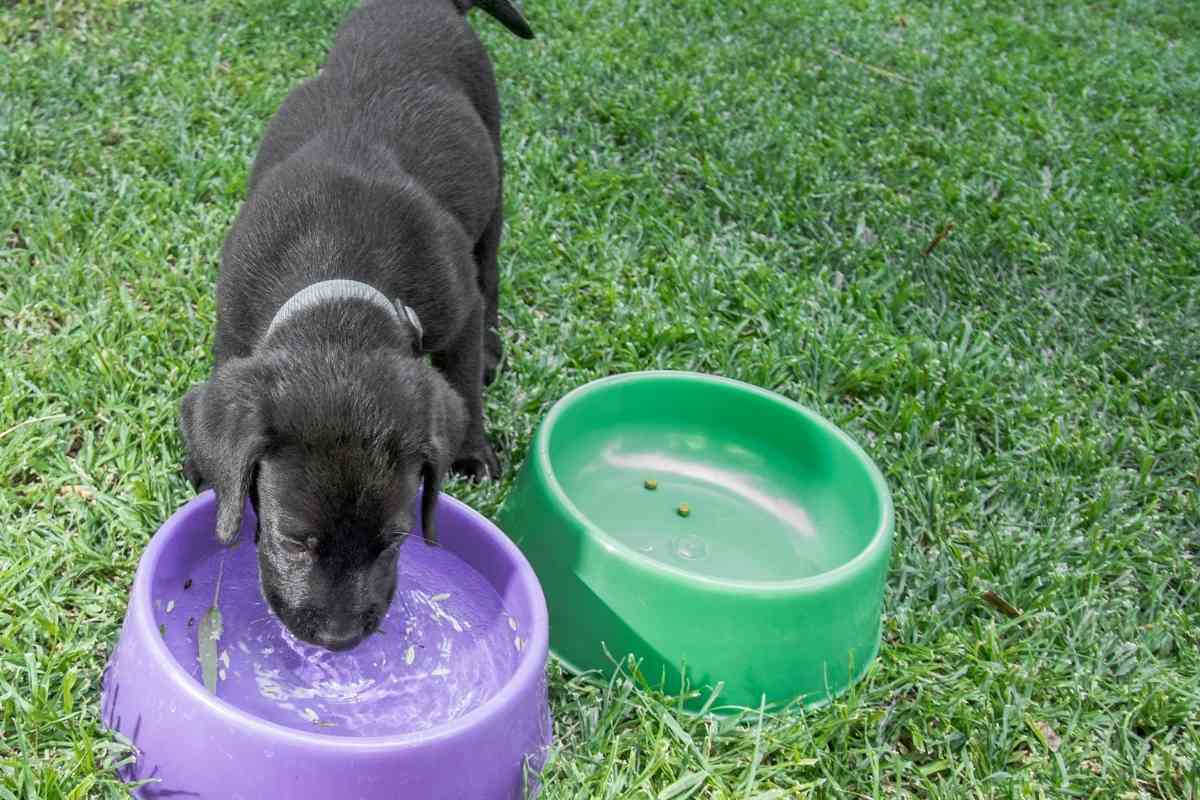
While most puppies love drinking water, some will not drink enough water even when you have placed it for them. You should not be worried about this since each dog is different. However, hydrating remains crucial for your puppy to grow healthy and strong.
Below are a few suggestions and strategies for increasing your puppys water intake:
- Add a little bone or chicken broth to the puppys water; you must ensure that the broth you add is not salted.
- Check whether the puppy is keen on ice cubes; certain puppies like them, and it can be a simple approach to boost their hydration levels.
- Change from dry to wet meals.
- Whenever the puppy consumes water, applaud him loudly and give him his favorite treat.
- Motivate and encourage your dog to drink water by regularly bringing the container to them.
Before panicking because your puppy is not consuming too much water, remember that thirst is on your side. If you can be a little creative in your approach to get your dog to drink more water, you will find that the puppy will be responsive.
However, once the pup gets used to drinking water, you should start slowly encouraging them to drink water, especially if you use additives to make them drink.
If you were giving them treats to praise them for drinking water, slowly refrain from doing so. This will help the young pup understand that you will reward the dog with a treat, not every time they drink water. You would not want your puppy holding you to ransom, would you?
Is Leaving Water Out for My Puppy at Night a Good Thing?
It is always a good idea to dump the water bowl at night. It simplifies toilet training, particularly if you require a good nights sleep.
Regarding final feeding and drinking intervals of the day, ensure you develop a regular schedule for your puppy. Doing so will help your puppy understand the expectation and give you time to take your pup outside for a bathroom break before bedtime. To help your dog calm down, eliminate all food and drink around three hours before sleep.
Additionally, emptying the water container at bedtime will reduce messes, particularly if the puppy naps in a crate. By doing this, you can be sure that your dog is well-rested and dry when you wake up rather than wet from all the splashing and spilling they did while they slept.
There are several accident-proof methods to offer access to water, especially if you are concerned that they might be thirsty at night.
Some containers attach to the edge of a crate to prevent them from toppling over. You only need to add a small amount of water. Utilizing a drip feeder (similar to rabbit drip feeders) is still an excellent choice since it prevents your puppy from over drinking when they ought to be resting.
Is Drinking a Lot of Water Harmful to My Puppy?
Although less frequent than dehydration, consuming too much water can be harmful.
Take the pup to the doctor for a checkup if you find that they are consuming more water than they should. It can indicate a hidden problem that may need medical attention.
Puppies occasionally lack the maturity to understand the volume of water they need to consume. Reduce the quantity of water your puppy has access to at any moment if they start to vomit, get bloated, or become sluggish after drinking too much. Once they begin to understand how to control their intake, gradually reintroduce more water.

